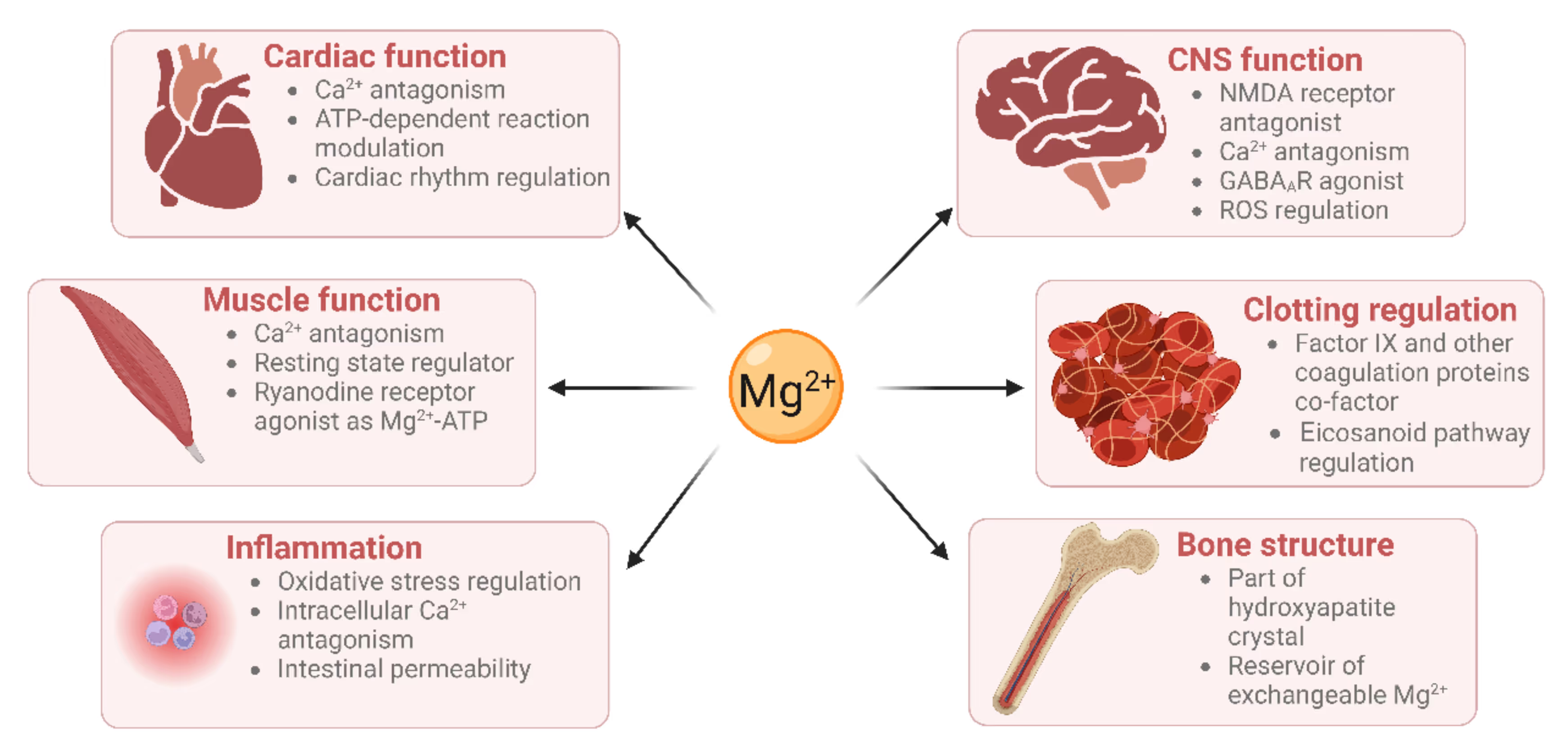Magnesium Blood Test
Magnesium is essential for over 300 biochemical reactions in the body. From nerve function to energy production to blood pressure regulation, magnesium is everywhere. Magnesium is crucial for supporting multiple body functions, including enzyme activities, muscle contractions, nerve signalling, and maintaining heart health. Yet, most people don’t know their levels. A magnesium blood test is one of the easiest ways to assess a hidden deficiency that could be impacting your performance, your sleep, and your long-term health. In this article, we’ll break down everything you need to know about magnesium, what a test shows, and how Everlab makes it easy to take action.

Magnesium Blood Test, Book Mg Blood Test in Australia Today
What:
Blood biomarker
Tests for:
Magnesium deficiency
Referral:
Required
Member cost:
$20-$60
What Is Magnesium?
A Vital Mineral
Most magnesium in the body is stored in bones and tissues, with only a small fraction present in the blood. It’s a cofactor in hundreds of enzymatic processes, including DNA replication, energy metabolism (ATP production), and protein synthesis.
Magnesium acts as a gatekeeper for calcium entering cells and is crucial for electrical activity in your nerves and muscles. Without it, your body’s electrical and metabolic systems falter.
How It's Measured
Magnesium is most commonly measured via a serum magnesium test—a simple blood draw. This test looks at the concentration of magnesium circulating in your bloodstream, which accounts for only ~1% of your total magnesium. Only a small amount of the body's magnesium circulates in the blood.
A magnesium blood test measures the amount of magnesium circulating in your blood. The test measures the amount of magnesium in the blood, which may not fully reflect total body magnesium stores.
Other types of testing include:
- Red blood cell (RBC) magnesium: reflects intracellular stores. Measuring magnesium in red blood cells can provide a more accurate assessment of magnesium deficiency.
- Ionised magnesium: measures biologically active magnesium but is not widely available.
Serum magnesium is widely used and can still indicate deficiency, particularly if paired with symptoms. However, a regular magnesium blood test might not always detect deficiencies or excesses, and other tests like RBC magnesium can offer more insight.
Why Get a Magnesium Blood Test?

It’s Often Low—Without Symptoms
Studies show around 30–50% of people don’t meet the recommended intake of magnesium. Low dietary intake is a common cause of magnesium deficiency. Magnesium deficiency often goes undetected because the body pulls magnesium from bones and cells to maintain normal blood levels—masking deeper issues.
It Affects Major Health Systems
Magnesium deficiency can contribute to a range of health conditions, including those affecting the cardiovascular, metabolic, neurological, and muscular systems.
- Cardiovascular health: Low magnesium is linked to health conditions such as hypertension, atherosclerosis, and arrhythmias.
- Metabolic health: Magnesium deficiency worsens insulin resistance, contributing to health conditions like type 2 diabetes.
- Neurological health: Deficiency can lead to health conditions including migraines, depression, and poor sleep.
- Muscular function: Cramps, spasms, and fatigue are classic signs of low magnesium and are common health conditions related to deficiency.
Performance and Recovery
If you’re active or athletic, magnesium matters even more. You lose it in sweat. Low levels increase the risk of cramping, delayed recovery, and reduced energy.
Long-Term Risk Management
Chronic magnesium deficiency is associated with various medical conditions, including:
- Type 2 diabetes
- Heart disease
- Osteoporosis
- Alzheimer’s disease
- Chronic fatigue and fibromyalgia
Testing is the first step toward prevention.
What Affects Magnesium Levels?
1. Diet
Magnesium is highest in foods like leafy greens, legumes, seeds, and whole grains. Including more magnesium in your diet through these foods can help support heart health and lower blood pressure. But soil depletion, food processing, and restrictive diets mean most people don’t get enough.
2. Gut Absorption
Conditions like:
- Coeliac disease
- Crohn’s disease
- Chronic diarrhoea
…all impair magnesium absorption by interfering with how the body absorbs magnesium from food.
3. Medications
Common drugs that deplete magnesium:
- Proton pump inhibitors (e.g. Nexium)
- Diuretics
- Some antibiotics
- Chemotherapy agents
4. Alcohol Intake
Alcohol increases urinary excretion of magnesium and damages gut lining—reducing absorption.
People with alcohol use disorder are at higher risk for magnesium deficiency because this condition leads to increased magnesium losses and impaired absorption.
5. Stress and Physical Demand
Stress raises cortisol and adrenaline, which deplete magnesium stores. Athletes, shift workers, and busy professionals are often at risk.
6. Vitamin and Mineral Imbalances
- Low Vitamin D impairs magnesium absorption.
- High calcium can compete with magnesium.
- Zinc excess interferes with magnesium uptake.
Magnesium deficiency can also disturb potassium levels, potentially leading to muscle cramps and abnormal heart rhythms.
Relationship Between Magnesium and Blood Pressure
Magnesium is a key player in keeping your blood pressure within a healthy range. It works by helping to regulate the movement of calcium and potassium ions across cell membranes, which is essential for proper muscle contraction and relaxation—including the muscles in your blood vessels. When your magnesium levels are optimal, your blood vessels can relax more easily, which helps lower blood pressure and reduces the strain on your heart.
If you have magnesium deficiency, your blood vessels may constrict more, leading to high blood pressure. This is why a magnesium blood test is often recommended for people with hypertension or those at risk. The test measures how much magnesium is circulating in your blood, helping health professionals determine if low magnesium could be contributing to your blood pressure issues.
Research shows that magnesium supplementation can help lower blood pressure in people with high blood pressure, but it’s important not to take too much magnesium without guidance. Excess magnesium can cause its own set of problems, so always consult your healthcare provider before starting supplements. Regular blood tests can help you and your doctor monitor your magnesium levels and adjust your plan as needed.
Crohn’s Disease and Magnesium
For people living with Crohn’s disease, maintaining healthy magnesium levels can be a challenge. Crohn’s disease often leads to chronic inflammation and damage in the digestive tract, which can interfere with the body’s ability to absorb magnesium from food. Frequent diarrhoea and surgical removal of parts of the intestine can further increase the risk of magnesium deficiency.
A serum magnesium test measures the level of magnesium in the blood and is a valuable tool for detecting deficiency in people with Crohn’s disease. Low magnesium can worsen symptoms like fatigue, abdominal pain, and diarrhoea, making it even more important to monitor your levels.
If a deficiency is found, magnesium supplements may be recommended to restore healthy levels and support overall wellbeing. However, it’s essential to work closely with your healthcare provider to determine the right amount of magnesium for your needs and to monitor your response to treatment. Regular testing ensures that your magnesium in the blood stays within the normal range and helps prevent complications.
Kidney Function and Magnesium
Your kidneys are central to maintaining the right balance of magnesium in your body. They filter your blood, removing excess magnesium and excreting it in the urine. When kidney function is impaired—such as in kidney failure or renal dysfunction—this delicate balance can be disrupted. If the kidneys can’t remove enough magnesium, levels can rise too high, leading to excess magnesium in the blood. Conversely, some kidney conditions can cause the body to lose too much magnesium, resulting in low magnesium levels.
A magnesium blood test is an important tool for monitoring magnesium levels in people with kidney disease. Health professionals may recommend dietary changes, such as eating more green leafy vegetables, or magnesium supplements to help maintain the right amount of magnesium. However, it’s crucial to avoid too much magnesium, especially if kidney function is reduced.
Certain medications, including proton pump inhibitors, can also affect magnesium absorption and excretion, making regular lab tests even more important for people with kidney issues. By working closely with your healthcare provider and having regular blood tests, you can help keep your magnesium levels in check and reduce the risk of complications.
How to Prepare for a Magnesium Blood Test
- No fasting needed (unless part of a broader blood panel).
- The test requires a blood sample, which is typically drawn from a vein in your arm.
- Avoid magnesium supplements for 24 hours beforehand.
- Inform your clinician of any medications.
- Stay well hydrated.
- If testing alongside other minerals (like calcium, phosphorus), follow specific prep instructions if provided.
Understanding Your Magnesium Test Results

Normal Range
- Serum magnesium: 0.85 - 1.3 mmol/L — This range represents normal magnesium levels in the blood. Maintaining normal magnesium levels is important for overall health.
Low Magnesium (Hypomagnesemia)
Can present as:
- Muscle cramps or spasms
- Fatigue and weakness
- Nausea or vomiting
- Numbness and tingling
- Heart palpitations
- Abnormal heart rhythms (in severe cases)
High Magnesium (Hypermagnesemia)
More rare. Often due to:
- Kidney dysfunction
- Excessive supplementation
Symptoms:
- Low blood pressure
- Confusion or lethargy
- Difficulty breathing
- Arrhythmias
- Muscle weakness
- Irregular heartbeat
Risks and Limitations of the Test
- Serum magnesium reflects only extracellular levels (1% of total magnesium)
- Intracellular deficiency may still be present despite a normal result
- Recent supplementation can temporarily elevate levels
- Best interpreted alongside symptoms, kidney markers, calcium, phosphorus, and vitamin D
- Magnesium homeostasis is tightly regulated by the kidneys, so abnormal magnesium levels can sometimes be missed by standard serum testing
Magnesium and Long-Term Health
Chronically low magnesium plays a role in many age-related conditions:
- Cardiovascular disease: magnesium helps maintain vascular tone and reduces calcification
- Insulin resistance: magnesium is a cofactor for insulin signalling
- Bone health: the body's magnesium works with calcium, vitamin D, and parathyroid hormone to maintain bone density
- Cognitive function: low magnesium is linked to dementia and depression
- Muscle loss (sarcopenia): inadequate magnesium can reduce muscle protein synthesis
How to Improve Magnesium Levels
1. Magnesium-Rich Foods
Include:
- Spinach, Swiss chard
- Pumpkin seeds, chia seeds
- Almonds, cashews
- Avocados
- Quinoa
- Dark chocolate (85%+)
2. Magnesium Supplements
Different forms have different benefits:
- Magnesium glycinate: calming, supports anxiety and sleep
- Magnesium citrate: supports bowel movement
- Magnesium malate: energising
- Magnesium threonate: crosses blood-brain barrier, supports cognition
Start low and increase as tolerated. Side effects like diarrhoea indicate too high a dose. Taking extra magnesium beyond what the body needs can lead to hypermagnesemia, especially in people with kidney problems.
3. Reduce Depleting Factors
- Limit alcohol
- Address digestive issues
- Reduce high-dose calcium/zinc if not medically necessary
- Prioritise sleep and stress reduction
Sources
1. Rosanoff, A., Weaver, C. M., & Rude, R. K. (2012). Suboptimal magnesium status in the United States: are the health consequences underestimated? Nutrition Reviews, 70(3), 153–164. https://doi.org/10.1111/j.1753-4887.2011.00465.x
2. Volpe, S. L. (2013). Magnesium in disease prevention and overall health. Advances in Nutrition, 4(3), 378S–383S. https://doi.org/10.3945/an.112.003483
3. Kass, L., et al. (2012). Effect of magnesium supplementation on blood pressure: a meta-analysis. European Journal of Clinical Nutrition, 66(4), 411–418. https://doi.org/10.1038/ejcn.2012.4
4. Nielsen, F. H., & Lukaski, H. C. (2006). Update on the relationship between magnesium and exercise. Magnesium Research, 19(3), 180–189. https://pubmed.ncbi.nlm.nih.gov/17172008/
Get On Top Of Your Magnesium Levels
Magnesium is vital for energy, metabolism, sleep, heart health, and more. Even a mild deficiency can quietly undermine your wellbeing. At Everlab, we test your magnesium levels as part of a broader diagnostic view—giving you clear insights and personalised strategies to optimise performance, prevent disease, and protect long-term health.
.avif)


imaging

biomarkers

sterols
Book a Free Discovery Call
Join 20,000+ Australians improving their health with proactive, personalised healthcare.